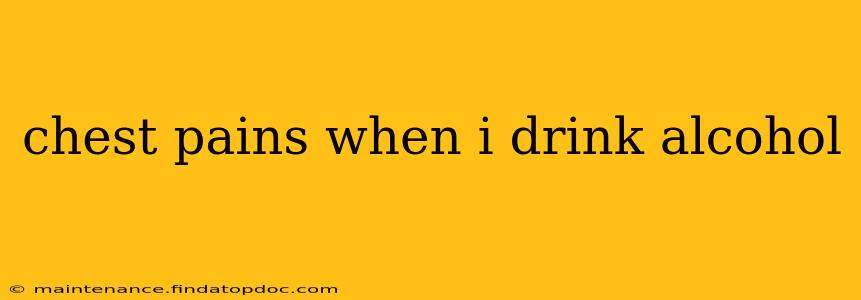Experiencing chest pain after drinking alcohol is never something to take lightly. While it might sometimes be a minor discomfort, it can also indicate a serious underlying health problem. This comprehensive guide explores the potential causes of chest pain associated with alcohol consumption, helping you understand when it's a reason for concern and when you should seek immediate medical attention.
What Causes Chest Pain After Drinking Alcohol?
The connection between alcohol consumption and chest pain is complex, with several possible explanations. It's crucial to understand that the pain's location, intensity, and accompanying symptoms can significantly influence the diagnosis.
1. Gastroesophageal Reflux Disease (GERD): Alcohol relaxes the lower esophageal sphincter, allowing stomach acid to reflux into the esophagus, causing burning chest pain (heartburn). This is a common cause of chest pain after drinking, especially if you already suffer from GERD.
2. Cardiac Issues: While less common, alcohol can exacerbate existing heart conditions or trigger cardiac events in susceptible individuals. This can manifest as chest pain, pressure, or tightness, often accompanied by shortness of breath, sweating, or dizziness. This is a serious medical emergency requiring immediate attention.
3. Pancreatitis: Excessive alcohol consumption can lead to pancreatitis, an inflammation of the pancreas. This can cause severe upper abdominal pain that may radiate to the chest, along with nausea, vomiting, and fever. This is also a serious medical emergency.
4. Esophageal Spasms: Alcohol can trigger spasms in the esophageal muscles, resulting in sharp, chest pain. These spasms are often brief but can be intensely painful.
5. Anxiety and Panic Attacks: Alcohol can worsen anxiety, potentially triggering panic attacks, which can manifest as chest pain or tightness, rapid heartbeat, shortness of breath, and feelings of impending doom.
6. Muscle Strain or Injury: While less directly related to alcohol, excessive drinking can lead to poor posture and muscle strain, potentially causing chest pain.
7. Acid Reflux: Similar to GERD, acid reflux happens when stomach acid flows back into the esophagus. Alcohol can worsen acid reflux leading to discomfort in the chest.
Is Chest Pain After Drinking Alcohol Always Serious?
Not all chest pain after drinking alcohol is serious, but it's vital to differentiate between minor discomfort and a potentially life-threatening condition. Minor discomfort, such as mild heartburn, might resolve on its own. However, any persistent, severe, or unusual chest pain warrants immediate medical attention.
When Should I Seek Immediate Medical Attention?
Seek immediate medical help if you experience chest pain accompanied by any of the following:
- Severe or crushing chest pain: Pain described as squeezing, pressure, or tightness.
- Shortness of breath: Difficulty breathing or feeling breathless.
- Sweating: Excessive sweating or clammy skin.
- Nausea and vomiting: Feeling sick to your stomach.
- Dizziness or lightheadedness: Feeling faint or unsteady.
- Irregular heartbeat: A noticeably fast, slow, or irregular heartbeat.
- Pain radiating to the arm, jaw, neck, or back: Pain spreading from the chest to other areas.
Can I Prevent Chest Pain After Drinking Alcohol?
While you can't entirely eliminate the risk, you can take steps to minimize the likelihood of chest pain related to alcohol consumption:
- Moderate alcohol consumption: Limit your intake to recommended levels.
- Avoid binge drinking: Consuming excessive amounts of alcohol in a short period significantly increases the risk.
- Eat before drinking: Food helps to slow alcohol absorption.
- Stay hydrated: Drink plenty of water to help your body process alcohol.
- Manage existing conditions: Properly manage underlying conditions like GERD or heart disease.
What are other symptoms I should look out for?
This is a crucial question to address. Alongside chest pain, watch out for additional symptoms such as shortness of breath, nausea, vomiting, dizziness, sweating, and radiating pain to your jaw, neck, or arms. These could indicate more serious problems.
How can I know if it's related to alcohol consumption?
Paying close attention to the timing of the pain is critical. If the chest pain occurs shortly after or during alcohol consumption and subsides once the alcohol has left your system, it is more likely related to alcohol. Keep a record of your drinking habits and the onset of symptoms to aid your doctor.
Conclusion
Chest pain after drinking alcohol can stem from various causes, ranging from mild indigestion to life-threatening cardiac events. While minor discomfort might resolve on its own, any severe or concerning symptoms warrant immediate medical attention. Understanding the potential causes and seeking appropriate medical care when necessary is crucial for maintaining your health and well-being. This information is for general knowledge and does not substitute professional medical advice. Always consult a doctor for any health concerns.
